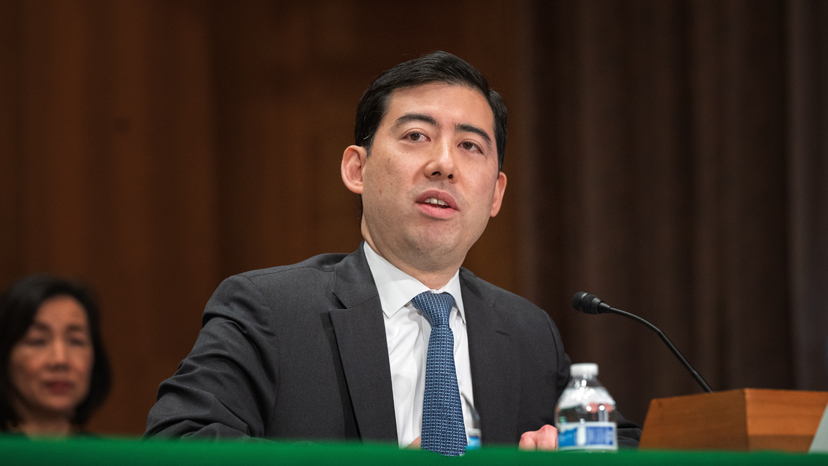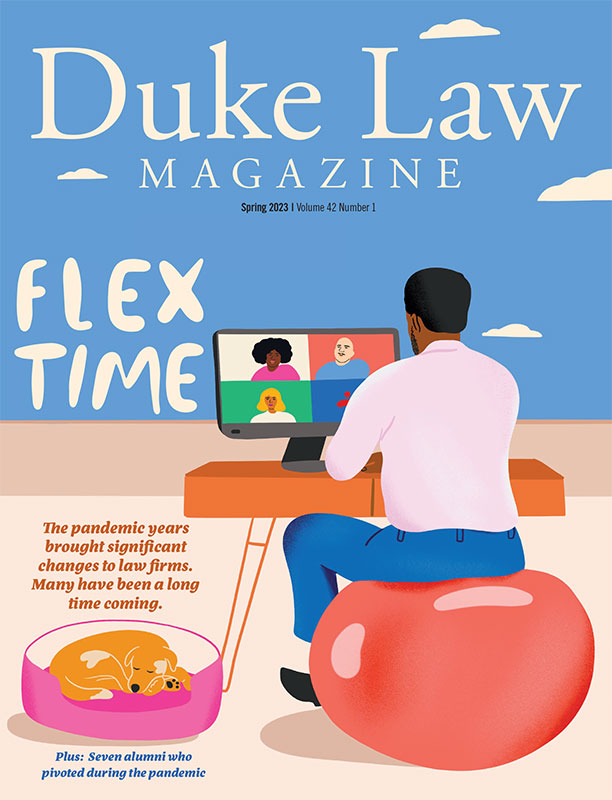
Mark Uyeda ’95
When Mark Uyeda arrived for his first day as a member of the U.S. Securities and Exchange Commission last June, he was in a familiar place. He had been on the SEC staff since 2006 in a variety of positions, including senior advisor to Chairman Jay Clayton, senior advisor to Acting Chairman Michael S. Piwowar, and counsel to Commissioner Paul S. Atkins. At his nomination hearing before the Senate Banking, Housing and Urban Affairs Committee, the committee’s then-ranking member, Sen. Pat Toomey (R-Pa.) had lauded him as “exceptionally well-qualified” and his expertise “unrivaled,” and noted that seven former commissioners publicly supported his confirmation.
But as Uyeda points out, being commissioner is a different job than any he’s had in the past.
“It’s much different when you’re just not advising someone how to vote, but it actually is your vote,” says Uyeda, who is the first Asian Pacific American to serve on the SEC. “I want to make sure that I’m doing everything to uphold my obligations as a commissioner to make fully informed decisions.”
Uyeda has spent more than three decades familiarizing himself with the inner workings of the capital markets and securities regulations, first as a business major and Capitol Hill intern, then as a law student at Duke. In practice at Kirkpatrick & Lockhart (now known as K&L Gates) and O’Melveny & Myers, he advised public companies and investors. And immediately prior to joining the SEC staff, he served as chief advisor to the commissioner of the California Department of Corporations, which regulates both securities laws and non-bank financial lending laws in the state.
“Mark is a dedicated public servant and an extremely talented securities lawyer,” Toomey said. “He has over 25 years of experience in securities and corporate law. That includes experience of regularly preparing prospectuses and 10-Ks for public companies filed with the SEC, which I am told is something that no other current SEC commissioner has done.”
Uyeda stepped into the role at a challenging time for the SEC. Activism around environmental, social, and governance (ESG) issues, a surge in social media-driven retail investing, and the rise and fall of cryptocurrency players have crowded the agency’s regulatory agenda and enforcement docket. One of two Republicans on the five-member commission, Uyeda is already fighting an uphill battle in some debates, and the term he was chosen to fill expires June 5, though President Joe Biden could choose to leave him in place for up to 18 more months.
“Being in the minority is an experience that I have gone through before,” Uyeda says, noting his time advising Piwowar during the Obama administration. “But I don’t view it through a partisan lens. I’m not a politician and I’m not accountable to the voters, and I think that affects my philosophical approach to being a federal financial regulator. We have a degree of independence and insulation from political forces.”
As a child in Orange County, Calif., Uyeda worked summers in his family’s produce delivery company, helping haul cartons of fruits and vegetables to restaurants and stores. His grandfather had first started the business to support his five siblings after their parents died, but had to rebuild it after World War II, when the U.S. government sent him and his family, including Uyeda’s mother, to an internment camp for Americans of Japanese descent. (At the same time his uncle was serving in the U.S. Army and earning a Bronze Star).
“Finding startup capital was difficult for my grandfather, particularly in an era where racial discrimination was common,” Uyeda said at his nomination hearing. “Yet he persevered and accomplished the American dream.”
Certain that he wanted a career in either finance or law and enticed by the excitement of Washington, D.C., Uyeda studied business at Georgetown University. As a sophomore, he landed an internship with Rep. Christopher Cox, then newly elected from Southern California, who had practiced corporate transactional law as a partner at Latham & Watkins and clerked on the Ninth Circuit U.S. Court of Appeals, a path Uyeda found appealing. He maintained the internship through his junior and senior years and Cox, who served 17 years in Congress and later chaired the SEC, would become a key mentor and supporter.
“I very much welcome having Mark at the table at the SEC as it undertakes numerous decisions that are unrivaled in its history. His calm question of limits and the foundations for moving forward will not just salve regulatory zeal but likely will move the end product of these regulatory initiatives to a better place.”
— Professor James Cox
Other influential figures awaited Uyeda at Duke, where he enrolled just a few months after graduating from college. Jonathan Wiener, the William R. and Thomas L. Perkins Professor of Law, Professor of Environmental Policy, and Professor of Public Policy, gave him a grounding in the Administrative Procedure Act and notice-and-comment rulemaking in his Environmental Law class that he relies upon in his work today. And frequent conversations with Brainerd Currie Professor of Law James Cox, who taught him Business Associations and Securities Regulation, offered opportunities to debate the role of regulation in America’s economic life with a renowned expert on the topic.
Uyeda was “an excellent foil,” well-versed in capital markets and private enterprise but naturally skeptical of moving away from Adam Smith’s “invisible hand,” says Cox.
“Our discussions, really interchanges, that occurred immediately after class or more extensively in my office, were typically focused on whether regulatory provisions covered in class work,” he adds. “More often, we talked through where to locate the reasonable boundary of government action into private markets.
“As a student of the SEC now for over 50 years, I can say with confidence that his appointment should not be surprising to anyone who knew Mark.”
Uyeda believes that many actions the agency might be tempted to take would be better left to Congress and the president. As an example, he points to the push to enshrine ESG principles in SEC rulemaking, including a March 2022 proposal that would require corporate disclosure of risks related to climate change. In speeches since becoming commissioner, he has cautioned that the commission’s proposed rule would burden companies with additional expenses without necessarily improving investor returns. The same might be true of potential agency action on labor-management relations, governance, and other non-financial issues, he says. “I think we need to respect the narrow scope of our authority as regulators.”
At the same time, he’d like to see more opportunities for individual investors to participate in capital formation. He recently came out in favor of relaxing the requirement that only relatively wealthy “accredited investors” can participate in private offerings that have the potential to generate higher rates of growth than public companies. And he notes that despite the collapse of cryptocurrencies in 2022 and the SEC taking more than 120 enforcement actions against players in the crypto markets for misleading investors and other violations, guidance or rulemaking related to crypto was “conspicuously absent” from the SEC’s fall regulatory agenda.
While many cryptocurrencies involve investment contracts and thus constitute securities subject to existing rules, others are not so clearly labeled, he says. But there are market participants that want to stay within the law but may not know how to do so.
“We need to make sure that our rule book can properly apply to cryptocurrencies. If there are amendments or guidance that need to be given to say when you custody these cryptocurrencies that are securities, here’s what you need to do, we need to spell out what those are. What would not be acceptable to me is to put you in a catch-22 and say it’s impossible for you to comply.”
Cox says his former student’s thoughtful approach will ultimately benefit investors and the public, especially at a time of political polarization and economic uncertainty.
“I very much welcome having Mark at the table at the SEC as it undertakes numerous decisions that are unrivaled in its history,” Cox says. “His calm question of limits and the foundations for moving forward will not just salve regulatory zeal but likely will move the end product of these regulatory initiatives to a better place.”

